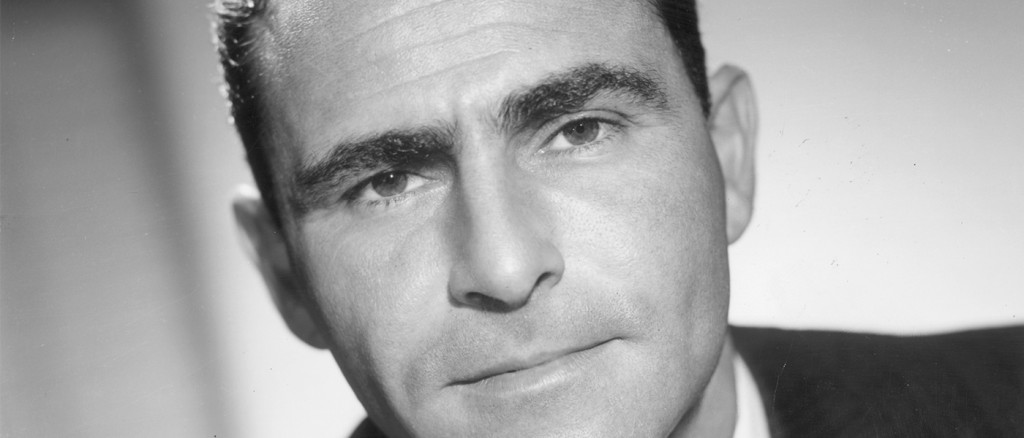Although his family moved to Binghamton when he was just 2 years old, Syracuse still proudly proclaims itself to be the birthplace of Rod Serling.
Best remembered for his science-fiction anthology TV series The Twilight Zone (1959-1964), Serling had a prolific career as a playwright, screenwriter, educator and family man. This weekend marks the 40-year passing of Serling, who died from a heart attack at age 50 on June 28, 1975.
Given Serling’s local heritage, The Twilight Zone is full of local connections and references. For the 1959 episode “Walking Distance,” in which the main character finds himself returning to his childhood hometown to discover it exactly as it was during his youth. Serling drew inspiration from Binghamton’s Recreation Park, particularly its distinctive carousel. The park is a short distance from Serling’s boyhood home, which still stands on Bennett Avenue.
“It’s become a game for local people to watch the episodes and find local references,” said Robert Thompson, a professor of popular culture and television history at Syracuse University.
Serling graduated from Binghamton High School in 1943, and enlisted in the U.S. Army the very next day. After his World War II service as a paratrooper in the Pacific Theater, he attended Ohio’s Antioch College, where he majored in literature and earned a Bachelor of Arts degree. He then began his career as both an actor and writer for radio and television.
TV anthology series are where Serling first established himself as a writer. He wrote several scripts for the CBS series Playhouse 90, including the acclaimed Requiem for a Heavyweight, which dominated the 1956 Emmy awards, as well as earning the first Peabody award ever given to an individual script. It would later be adapted into a 1962 movie, for which Serling wrote the screenplay.
As the host and narrator of The Twilight Zone, Serling became a television icon. However, those who knew him in person described the real-life Serling as a distinctly different person from his on-screen persona.
Anne Serling, the late writer’s daughter, describes her father as a gentler individual. “My dad was so brilliantly funny,” she said. “He had a magnetic personality. My friends adored him, though they were wary at first, tying him into things like The Twilight Zone, but within moments they felt comfortable. He couldn’t have been a more polar opposite (to his screen persona).”
Serling’s television work was radically different from most other contemporary programming in that it took on social and political themes. Serling was also vehemently opposed to censorship, especially that which stood in the way of the message of his work. Anne Serling recalls the 1956 script of her father’s U.S. Steel Hour teleplay Noon on Doomsday, the story of a small-town murder that was a commentary on the case of Emmett Till, the 1955 lynching of a black teenager by two white men who were subsequently acquitted. “That was a case that really haunted him,” Serling’s daughter recalled. “He had to write three different scripts over several years, because the censors just had a field day with it.”
Diane Gayeski, who attended several of Rod Serling’s lectures when she was a student at Ithaca College, said, “Those were the things he really thought deeply about. Not just doing work that got a big audience, or that was creative just for creativity’s sake, but really using the medium as a way to educate and enlighten people, and give them new perspectives on the human condition.”
Anne Serling believes that her father used the science-fiction genre to obscure the real-life commentary. “His quote was ‘an alien can say what a Republican or Democrat couldn’t.” She also believes the political nature of The Twilight Zone is why it continues to be revered: “I think because he dealt with humanity and social issues, and, sadly, so many of these issues are still prevalent today.”



